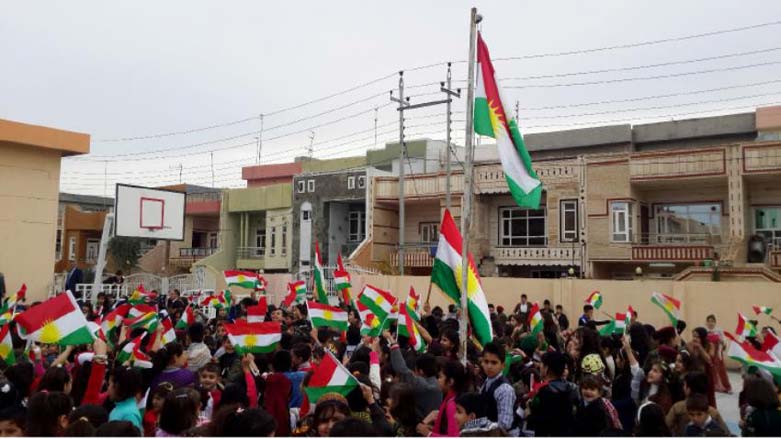Time for a Referendum on Kurdish Independence!

This week, the Kurdistan Region’s President, Masoud Barzani, directed the leadership of the Kurdistan Democratic Party (KDP) to begin discussions with other Kurdish parties in the region on holding a referendum on Kurdistan's independence. Mr. Barzani first raised this idea in July 2014, but it was postponed as the crisis with Da’esh (IS) erupted soon after. The Kurdish people will welcome the prospect of such a move toward the long-held dream of independence. But why now?
“In the midst of chaos, there is also opportunity,” wrote the Chinese strategist, Sun Tzu. If you can maintain the cohesion of your ranks and the clarity of your objectives while others grow disoriented and confused, you will have secured a considerable advantage. The Kurdistan Regional Government (KRG) now enjoys such circumstances.
The KRG is better positioned for a referendum on independence than it was in 2014. Several parties that ordinarily oppose Kurdish independence are in a state of disarray, the consequence of their mistakes.
First is Turkey. President Recep Tayyip Erdogan’s ambitious neo-Ottomanism has angered many parties. As one scholar at the influential American Enterprise Institute put it, Erdogan has “transformed Turkey into a regional pariah,” having alienated “Abu Dhabi, Baghdad, Cairo, Damascus, Jerusalem, Moscow, Ramallah, and, quite possibly, Riyadh.”
Turkey’s most serious antagonist is Russia. Military tensions have eased since Turkey shot down a Russian warplane last month. However, Russian President Vladimir Putin seems bent on sustaining political tensions. In his annual, end of the year press conference, Putin crudely described Turkey’s leadership as having “ decided to kiss the Americans on a certain body part.”
Moscow just welcomed the head of Turkey’s pro-Kurdish Peoples’ Democratic Party (HDP). Foreign Minister Sergei Lavrov told him that Russia was ready to work with Kurds fighting Da’esh, saying, “We know that there are Iraqi and Syrian Kurds among those who on the ground resist the threat from [Da’esh] and other extremist groups with weapons in their hands.”
A vulnerable Erdogan is looking for support wherever he can find it—including Israel. As the Financial Times put it: “Russia Rift Pushes Turkey to Mend Fences with Israel.” However, Jerusalem insists that Ankara close Hamas’ facilities in Istanbul, from where Hamas has directed terror attacks against Israelis. At U.S. insistence, Ankara just expelled a senior official in Hamas’ military wing, but, of course, Jerusalem wants Hamas’ entire operation shut down.
Similarly, Ankara has more need of cordial ties with the KRG than ever before. Notably, when Mr. Barzani visited Ankara earlier this month, he was welcomed “with open arms” and treated “with the protocol accorded to heads of state,” a columnist for the Turkish daily Al-Sabah wrote. He also noted that when Mr. Barzani’s plane landed in Ankara, the Kurdish national flag was flying at the airport—as it was during the meetings that Mr. Barzani held with Turkish officials. So Turkey seems more prepared than ever before to accept, however reluctantly, the movement toward independence that a referendum would represent.
Iraq is another important factor. Misgovernment in Baghdad was one key reason behind the emergence of Da’esh. While it is fighting Da’esh, Baghdad is in no position to block a Kurdish referendum.
A third key factor is the U.S. and the West more generally. The Kurds have proven themselves the most effective fighters against Da’esh, as Mr. Lavrov suggested. Similarly, U.S. Secretary of Defense Ashton Carter stated during his recent visit to Erbil, “The Kurdish Peshmerga have been exactly what we’ve been looking for in this whole fight in Iraq and Syria, namely a capable and motivated force that we can enable.”
The U.S. is counting on Peshmerga to play a crucial role in the liberation of Mosul. That provides the Kurdish leadership with more leverage and freedom of maneuver than they will have once Da’esh is defeated.
Westerners who put such stock in democratic ideals should have no objection to a referendum on independence or any other issue. However, those who still hold to Sykes-Picot and consider Iraq and Syria to be viable entities, despite the evident failure of both governments, can be expected to oppose a referendum on Kurdish independence. Unfortunately, that includes much of the U.S. administration, including the White House.
A referendum is just such a step. It is not a declaration of independence, merely a formal consultation with citizens. But the first such referendum in Kurdish history will provide a powerful impetus toward independence. And present circumstances seem opportune for just such a step.
Laurie Ann Mylroie, Ph.D., taught at Harvard University and the U.S. Naval War College. Most recently, she served as a cultural advisor to the U.S. military in Afghanistan.
